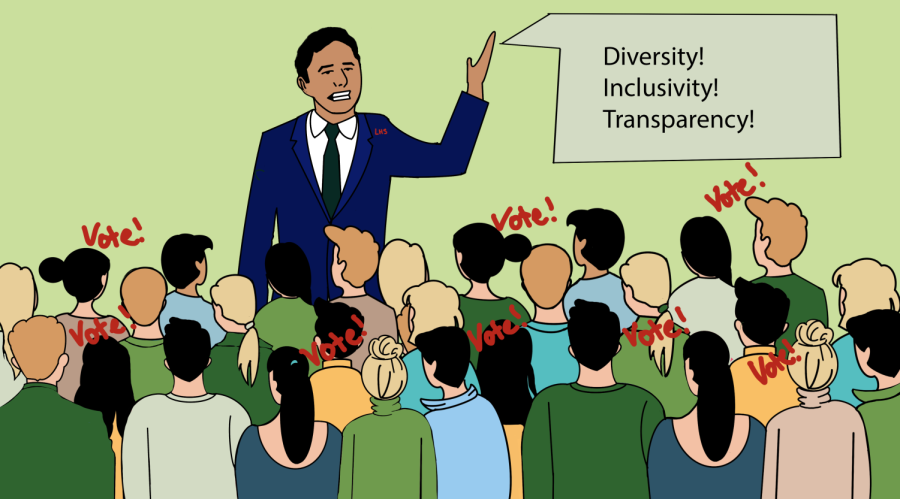ASB election promises are often unachievable
Graphic illustration by Anushka Anand
Many goals outlined in campaigns are often not even pursued once candidates are elected.
April 5, 2022
Colorful graphics and slogans fill students’ social media feeds during election season. To appeal to voters, candidates set glittering promises and lofty visions. While some goals are achieved, many of the goals outlined in campaigns are often not even pursued once candidates are elected.
The barrage of content on social media makes it difficult for voters to focus on the true content of a campaign, so ambitious goals with catchy phrases like “inclusivity” or “reducing stress” are often mentioned to convince voters that they can solve pervasive student issues. However, once elected, many realize that these goals are not feasible, as it is up to school administration and current ASB systems to approve bold new measures. Decisions like increasing tutorial time or changing the schedule are not up to ASB. Socials and study sessions involving many people in the school, excluding homecoming or rallies, often need to be toned down and made voluntary. Still, grandiose promises make campaigns more attractive, and students remember these goals more.
“For people who care or people who really look into those campaigns, I would consider who has this person worked with and how long have they worked with a certain organization for their goals,” junior and ASB Vice President-elect Allison Hsu said. “Even people within ASB lack information on how feasible their goals are, how needed they are and how receptive administration will be to them.”
Often, smaller goals that are concrete and visible to students are easier to fulfill. Continuations of current projects, such as student wellness weeks and student feedback collection, are much more feasible but may not attract voters. Efforts to change major elements of ASB like communication and organization are possible, but these changes are not large enough to be recognized by students as events that connect them to the class.
“There are many behind-the-scenes things our officers do to improve systemic actions, such as communication between ASB-officers-staff, discuss campus climate, improve the Constitutional bylaws, and more,” ASB Leadership class adviser Jason Lee said. “Often, those go unnoticed, but result in a more cohesive and efficient student government.”
Many officers campaign to enter their role with only an overarching vision of how they plan to serve the student body. This serves as a guide to how an officer wants to lead the class, but those visions are often not supported by concrete plans.
“What appeals most to class members are goals that directly impact them, as they can know when they’ve been achieved,” Class of 2024 Secretary Janhavi Venkatesh.
In addition, each officer role has a baseline set of tasks outlined by the ASB constitution, such as homecoming management and fundraisers, that they must fulfill before they can chip away at their own election goals.
“Most campaigns have vague goals on purpose, generally focusing on inclusivity or making the experience as great as it can be,’” sophomore and 2024 class treasurer Anshul Singh said. “It’s not a bad thing since it’s pretty much the job description for class office, but that’s what everyone focuses on.”
The vague job description of a class office role makes officers less accountable, and students are not in a position to hold the elected officers accountable. After election season, campaigns are forgotten, and even if some campaign promises are fulfilled, they are not recognized: All the focus is on collecting as many votes as possible, instead of on true practical changes the candidates can make in office. Class officers can hold themselves accountable by actively showing students the progress they have made in class office, even if students forget about their promises.
“To let students know what we did over the year [we created] yearly recap videos, and that really helped summarize everything we did,” Singh said.
When candidates campaign for a leadership position, they must think of how their goals can directly impact voters and how feasible they are. While promises cannot be unrealistic, they still need to be actions that voters can feel are directed toward them and that directly improve their time at Lynbrook.



































































